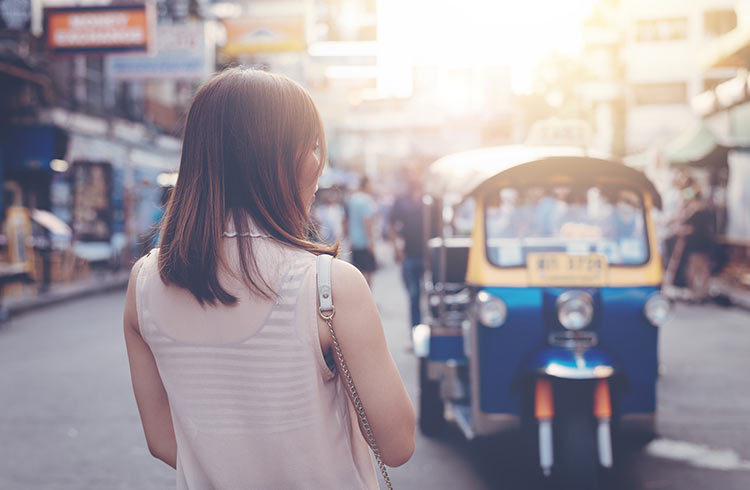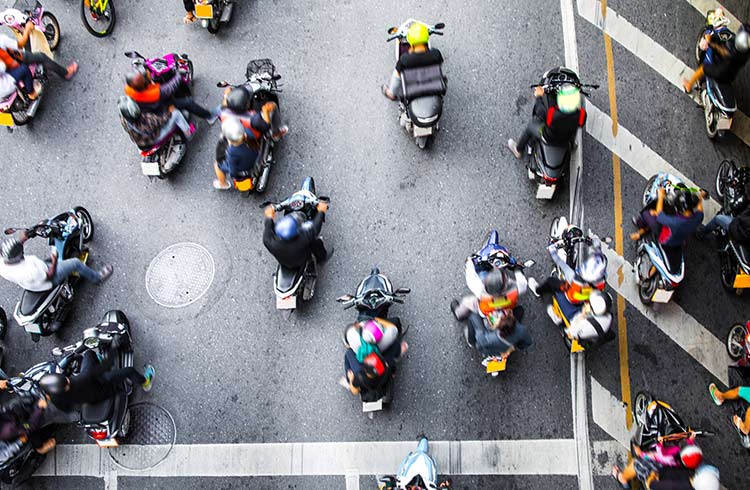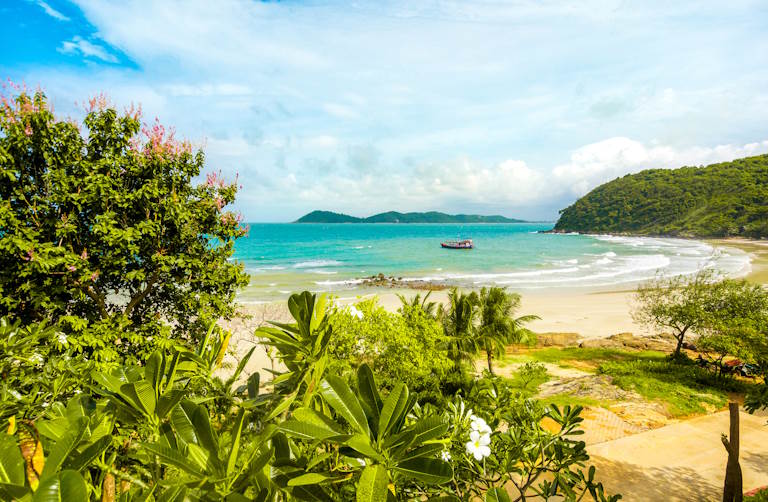Is Thailand Safe for Solo Women Travelers? 5 Safety Tips
Thailand is generally very safe for women traveling alone, but you should always be aware of your surroundings. Here are a few tips for solo travel.
 Photo © iStock/structuresxx
Photo © iStock/structuresxx
Thailand is a hugely popular destination for female travelers, who are widely treated with respect in this friendly Buddhist-majority nation. But during my 10 years living on-off in Thailand, I’ve learned there’s still a range of safety issues female tourists must consider, from scams to bag snatching and drink spiking.
- How to stay safe in taxis
- Look out for pickpocketing and bag snatching
- Drink spiking is a significant risk
- Be wary of other tourists
- How to protect yourself against scams
How to stay safe in taxis
In recent years, Thai media reported multiple cases of women being abducted and assaulted by taxi drivers. While this, is not a widespread problem in Thailand, there are several ways for female travelers to protect themselves when using taxis.
Firstly, it is highly recommended to use a taxi app such as Grab, which is the dominant such company in Thailand. This is convenient, cheap and safe. You can book your ride in advance, the fare is fixed, and your driver’s personal details are recorded on the app, which makes them unlikely to commit a crime, knowing how easily they’ll be identified.
Sometimes using Grab is not possible, such as at many Thai airports, where the company has largely been muscled out by traditional taxi companies. When in a regular taxi that you hail on the street, or catch at an airport, use your phone to take a photo of the driver’s ID, which will be on the left side of the dashboard.
This simple act will not only give you a record of their details, but it also will make the driver wary of you. It should be noted that the vast majority of Thai taxi drivers are honest, amiable people who pose no threat. It doesn’t hurt to be careful though.
Look out for pickpocketing and bag snatching
Violent robberies of tourists are rare in Thailand. What you need to be most mindful of is pickpocketing and bag snatching. The latter is a bigger threat to female travelers, who are more likely to be carrying a bag slung over one shoulder (such as a handbag), which is much easier to steal than a backpack.
Bag snatchers in Thailand typically operate on scooters. If a woman is walking by the road’s edge, particularly in a quiet area, these criminals ride up close, grab their bag and speed away. This is far less common in busy areas, where the criminal’s chance of being caught is far greater. The simplest tactic to protect yourself is to carry your bag on whichever shoulder faces away from the street. This way the snatcher will not be able to reach your bag while still sitting on their bike.
By contrast, pickpocketing is most abundant in crowded areas, particularly tourist hotspots like downtown Bangkok and Chiang Mai, or nightlife areas in Phuket, Koh Samui and Pattaya. To combat this I always wear pants or shorts with zipped pockets. Women can also guard against pickpockets by holding their handbags in front of them. And do not carry your passport outside your hotel, as this is your most difficult-to-replace item.
Drink spiking is a significant risk
Male and female tourists have been targeted by drink spiking in Thailand, as widely documented by the country’s media. In some cases, the criminal’s aim was sexual assault, in others it was robbery.
This is a particular risk to female solo travelers, who are viewed as vulnerable. So, if you’re heading out alone to a bar in Thailand, never leave your drink out of your sight.
While we’re on the topic of drinks, a more widespread threat to you than drink spiking is becoming ill from tap water. As a rule in Southeast Asia, never drink water served to you in a glass unless you see it poured from a sealed bottle of mineral water. I made this mistake in Kuala Lumpur once and was horrendously sick for three days.
Another time, in Koh Samui, I became very ill after drinking multiple soft drinks at a basic beach bar. I’m near-certain the ice blocks in them were the culprit. Because some small Thai venues such as this try to save money by making their own ice cubes from filtered water. The problem is that, unless these filters are cleaned regularly, the water, or the ice made from them, will not be safe for consumption.
Be wary of other tourists
As a foreigner in a country where your native English is not widely spoken, it’s natural to gravitate toward other Westerners. Just know that, from my experience living in Thailand, this country has a high number of shady tourists and ex-pats, males in particular.
Thailand has long been stereotyped as a hedonistic, anything-goes travel destination, which is why it attracts dodgy types. So don’t let your guard down when approached by a Western guy anywhere in Thailand, especially in nightlife areas. That doesn’t mean you should avoid them or be afraid of them. Just be wary, as you would back home.
How to protect yourself against scams
Don’t worry, Thailand isn’t brimming with scammers, as some hyperbolic online reports suggest. But there’s enough around that you need to be cautious. I know, because I’ve been duped in Thailand multiple times, although thankfully all were low-level scams that only cost me time or a small amount of money.
Granted, this is only anecdotal, but from my many conversations with fellow travelers in Thailand, it seems scammers are more likely to target females. Perhaps because most scammers are male and feel they can more easily intimidate a female tourist if things go awry.
Here are a few tips about common scams, based on my own experiences. Firstly, if a local with good English randomly approaches you outside a major tourist attraction, there’s a decent chance they’re a scammer. Politely decline their help or invitations. Secondly, do not hire a motorbike or jet ski. The companies that rent them are infamous for scamming tourists, claiming that you damaged their vehicle and demanding big sums of money. Lastly, if a taxi or tuk-tuk suggests they take you to a gem or jewelry shop, just say no. That’s a scam in the waiting.
Related articles
Simple and flexible travel insurance
You can buy at home or while traveling, and claim online from anywhere in the world. With 150+ adventure activities covered and 24/7 emergency assistance.
Get a quote


2 Comments